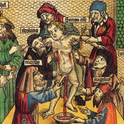In the 1960s, in his Beyond the Fringe days, Jonathan Miller distorted his mobile features into a truly agonised expression as he feigned a struggle to describe himself."I'm Jew-ish," he said. The audience chuckled deeply at the "I-don't-want-to-deny-it-and-I'm-not-really- practising-and-obviously-I-don't-want-to-be- associated-with-the-rest-of-them-but-now- you-come-to-mention-it-I-suppose-I-am" recognisable admission.
Jews and non-Jews in the theatre got the point. Up until recently, it wasn't chic to be Jewish in Britain. Perhaps Germany was too near in time and place for Jews to be able to relax. All I remember is being aware in some vague way that Jews suffered from low self-esteem and that they were keen to be accepted by gentiles of a certain class.
It hadn't so much struck me in my small town life—I grew up in Leigh-on-Sea in Essex where there was a reasonably contented Jewish community. But when I moved to London I started to meet Jewish people, men especially, who would distort their personalities and mannerisms to pass into upper middle class British society. They changed their names, their tailors, and moved to areas where other Jews didn't live; they denied their origins or didn't own up to it if it cropped up in conversation. In terminal cases, they took up hunting, shooting and fishing. Their idea of sexual heaven and marital triumph was to couple with a blonde gentile.
True, they weren't all like this. But if you were a Jewish woman (even a not-very-Jewish woman like me), you couldn't help but notice the number of prominent men who behaved in this way. It wasn't great for morale. At times, it really hit home. I was dating a man from a well-known Jewish family. They were ardent Zionists. At the end of the affair, over a tearfully miserable lunch in Wilton's, he took my hand and said: "I'll always love you. But I could never marry a Jewish girl." Who was talking about marriage? I just enjoyed the comfort of the affair.
Another time I found myself at Bow Street Magistrates' Court when a small-time film producer was accused of stealing some framed birds' eggs from my flat. A colleague of his—and my flat-mate, the Marquess of Reading's son, Lord Anthony Rufus-Isaacs, appeared, albeit reluctantly, for the defence. We had to take the oath. I said: "I'm Jewish, non-practising, and I'm happy to take the oath as it stands." It was with some dull shock that I heard Anthony, a member of the leading Jewish family in Britain say: "I'm Church of England." I knew he considered the whole Jewish thing vaguely distasteful and would just as soon disassociate himself from it. But until that moment I hadn't considered what the Readings represented to British Jewry, and the significance of what he was saying. Still, I'd been on enough country house weekends and heard enough anti-Semitic banter to realise it was a bit infra dig. Unless you felt secure in your roots and your life, you might well crave to be—and indeed change to—something else.
I never wanted to be anything else. Certainly I couldn't be bothered to change my religion. But until I went to live in New York in the early 1980s, I merely accepted it. It took a trip to New York to reveal to me that being Jewish gave me membership of a club encompassing the most neurotic and talented people I was likely to meet.
I loved New York. Maybe it was because being there, at the top of the heap, was rarely an accident of birth. Maybe it was because I didn't meet too many Hugh Grant lookalikes who twist signet rings and tell you they can trace their families back to 1503. Probably it was because drive and talent mattered more than anything else. New York Jews were in their element being uproariously themselves—they think they run the place and even though they don't, nobody else does. I discovered a place where I was embraced for being English, Jewish, whatever the hell I wanted so long as I could survive the fastest city on earth and laugh and scream at the ride.
Of course it helped that Yiddish was the most used and understood humour. My Italian Catholic neighbour would say oi vay along with the best of 'em. Of course it was great to clutch my stomach with laughter while a Jewish comedian commented on our odd, often hypocritical, behaviour. (In Britain we had to wait until ex-Rabbi Jackie Mason was drowning in applause before British Jews realised it was okay to expose our fears, insecurities and failings.) Yes, I loved being asked out by Jewish men for the first time in years. Sure they went for blonde shiksas, who doesn't? But you started out equal to any gentile provided you passed muster.
If I'd stayed, I'd have joined a synagogue, started taking part in the tradition and rituals. Okay, so I came home. But I brought with me that feeling that being Jewish was the most marvellous, heady, funniest and best thing to be. I might never have known that otherwise.
The last I heard of my ex-flat-mate Anthony, he was in Hollywood, producing pictures. A friend in LA reported: "These days he's playing down the Lord Anthony bit and concentrating on the Isaacs. Of course, you don't have to be Jewish in Hollywood but…"
Marcelle D'Argy Smith











